News
This report shows how teachers in Sokoto state are allegedly living off proceeds of child beggars
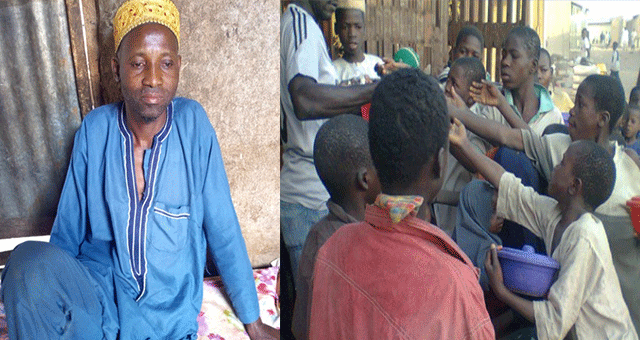
A new report published by The Cable details how teachers in the Almajiri schools built by the past administration, engage their students in street begging and leave off the proceeds from the street beggars.
The teachers allegedly chain some of the disobedient students on the leg if they refuse to go out begging. Read the shocking report below
In Sokoto state, there are 2,000 shoeless boys roaming the streets in tattered clothes. With bowls and dirty ropes suspended around their necks, they move in groups begging for alms. Their teachers, popularly known as mallams, supported by parents and cultural beliefs, encourage them to beg. This does not only deprive them the opportunity of an education, they also become tools in the hands of insurgents. TheCable visited four traditional Almajiri schools in Sokoto and found that the billions of naira spent on integrated Almajiri schools might be going down the drain.
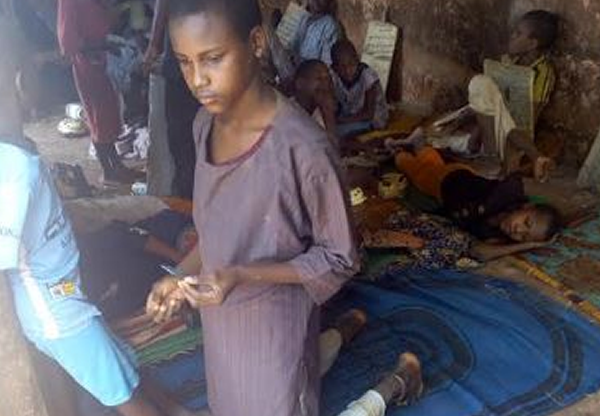
AN ENCOUNTER WITH CHILD BEGGARS
The sight at an Almajiri school in Gobirawa in Goronyo, a local government area west of Sokoto, would make any rational being emotional. The pupils look a little older than the regular 6-10-year-olds who roam the streets. There is no mistaking the frustration in their eyes. Their legs were clamped together with big iron chains. Upon inquiries, the warder said after the Quranic class, the boys go to beg and are required to give the money to their teachers. He explained that the ones in chain were disobedient. He said they run away with the money meant for their teachers. For few minutes, this reporter scanned the murky room, un-cemented floor, finger print-dirty wall. A boy lying on a blue mat tried to stand but couldn’t. He looked behind and noticed his chain was joined together with another. When he wanted to urinate, he would pee in a sachet of polythene bag, and then throw it outside the room. He looked towards the door for 18 seconds, and with a loud voice, he began to recite the Islamic inscriptions on his wooden plank. The mallam, owner of the school refused to speak further. He also refused to be named.
ORIGIN OF ALMAJIRI IN NIGERIA
In Nigeria, the Almajiri system of education started in the Kanem-Borno empire during the colonial era. The empire had a large number of rulers widely involved in Quranic literacy. More than 700 years later, the Sokoto caliphate was founded by a revolution. Sokoto caliphate and Borno caliphate started running the Almajiri system together. The year 1904 brought a new twist to the almajiri system as the British invaded the northern part of Nigeria. During the invasion, most traditional rulers were killed and others disposed.
The emirs who escaped death lost controls of their territories, this resulted also in the lost of fundamental control of the almajiri. Boko was introduced, boko meaning western education. The British abolished the state funding of almajiri schools. With no support from the community, emirs and government, the system collapsed. The teachers and students had no financial support, so, they turned into alms begging and menial jobs for survival.
ALARMING NUMBER OF OUT-OF-SCHOOL CHILDREN
Sokoto, home of the caliphate and the Muslim spiritual leader, is now among states with a huge number of out-school-children who in the name of seeking Islamic education are used as child beggars. With a total population of four million, school-age children population of 1.1 million and school enrollment of 610, 886, it is reported to have a literacy level as low as 15.1 percent, one of the least literate states in the northern geopolitical region of the country.
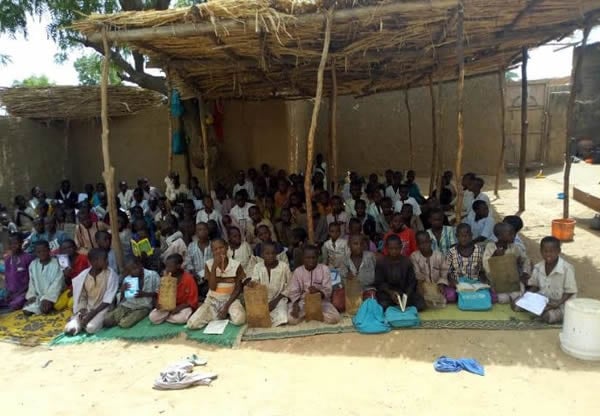
Pupils at Zamuya traditional Almajiri school
Under a bamboo tent at Aliu’s compound in Zamuya, boys numbering 190 squatted on their mats with their wooden slate bearing Arabic handwriting on one hand and their ‘tesbah’ (prayer bead) on the other. As this reporter stepped in, they chorused a long, ‘aamin’ to the prayers being offered by their 11-year-old class captain, Sanusi Abdulazeez. It was exactly 3:38 pm on a sunny Sunday afternoon. The class started around 2 pm, but prior that time, they had left Zamuya (some kilometres from the state capital) at 10am, to beg for food and money.
Begging in northern Nigeria started over 1000 years ago, according to Aliu. It is virtually what all Almajiri pupils in traditional Almajiri schools in Sokoto do, even when there is enough food to cater for them. The pupils, parents, and mallams see nothing in begging. They believe it’s a tradition that cannot be changed. TheCable learnt that when the children do not want to beg, the mallams compel them to. Many of the pupils, for the fear of punishment, were nervous to speak when approached. When the reporter wanted to press the shutter of his camera pointed to a group of Almajiri pupils struggling for food, one of them shouted and they all abandoned their rice cake (massa in Hausa), running towards different directions.
Part of the money collected from benefactors is used to buy rice cake food. There are thousands of them in the state capital. During break, they go in groups of eight, sometimes nine, and are always accompanied by a rice cake seller. The population at the traditional Almajiri school outnumbers that of the model schools.
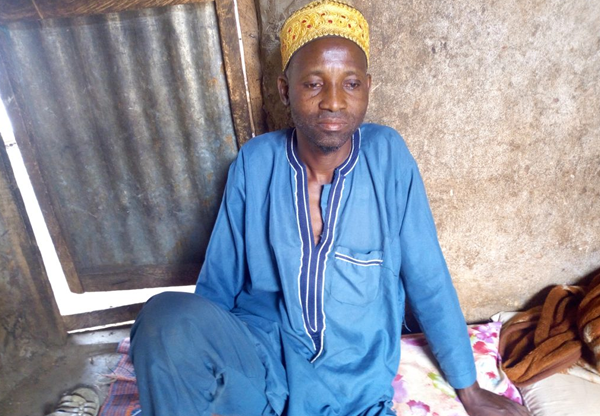
Boyi Ku: Owner of an Almajiri school
ONE MAN STANDS OUT
Lying on a mat in an unkempt room, Boyi Ku, an Islamic teacher and owner of Gidan Miye Almajiri school, looks sick and exhausted. In a chat with the reporter, Ku said he doesn’t collect money from the boys but offer them as workers for business individuals who use them as domestic helps.
“The pupils are attached to houses. People come to book them to be used as workers in their houses or shops,” he said. “I do it for Allah that’s why I have few children. I only accept the number of pupils I can teach,” Ku said.
He added that he does not accept money from the children or their parents. He also allows them to beg to get food and sustain themselves but does not force them. He said he only collects food from the pupils’ parents to feed himself and the children, who eat the food only on days they were not successful getting money.
“Other mallams collect the money the children realize from begging. But pupils do not respect mallams who do that,” he said.
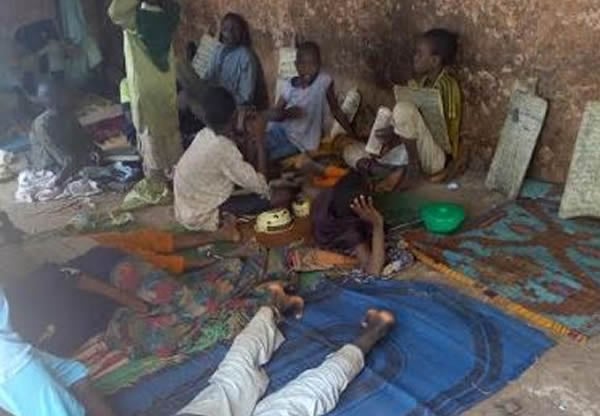
Almajiri
“The pupils are getting 60 percent of food from their parents and 40 percent from begging. Even though the children get 100 percent food, they will still go out and beg. The parents also think they are eating a balanced diet by getting varieties of food from begging,” he said.
Many of the children whom TheCable spoke to said they have not seen their parents for months.
“If my parents bring enough food for me, I will still go out and beg because it is tradition,” Abdulazeez, a pupil at Zamuya school, told TheCable.
NO TO CONVENTIONAL EDUCATION
TheCable gathered that parents see western education as evil while pupils say they can’t sacrifice Islamic education, which is their priority.
“I am learning a lot of Islam but I can’t speak English,” Abdulazeez says.
“I don’t want to learn western education because I will miss Islamic education,” Aminu Dahiri another boy said.
When asked why he sent his son to Almajiri school instead of the government’s integrated Almajiri school, Abubakar Muazu, a parent at Zamuya said it is not easy to provide food for his son in the school. He brings food, which he described as “honourable” to his son once every week. “I don’t want conventional system because I do not value it.”
However, another parent Ummaru Arzika countered Muazu’s opinion. “It is not that we (parents) don’t value conventional system. It is because it is a belief and tradition which they are not ready to change.”
MAKING THE DIFFERENCE
At an Almajiri school in Gidan-Miye, in addition to the Islamic knowledge, the boys are taught mathematics and english by a local non-governmental organisation -Alubarika Advocate for Health and Community Development Initiative (AHCDI)- every Thursday and Friday. The pupils are issued certificates at the end of the course after which the successful ones are registered to begin from primary five in one of the three integrated Almajiri model schools in the state.
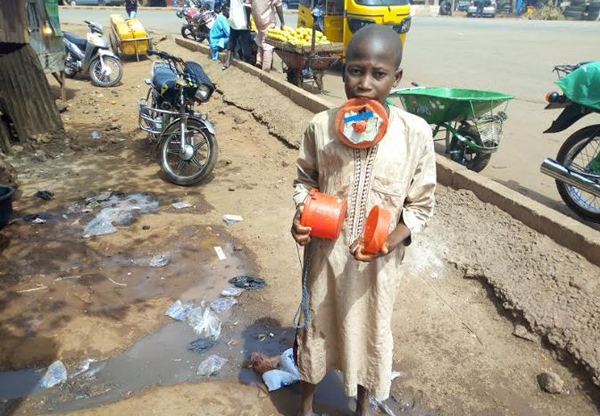
Almajiri
Checks show no sign of improvement in learning english and mathematics from the pupils. It also shows there are no significant efforts by the governments in reducing illiteracy in the state since there is no framework to navigate the pupils from the traditional system to the integrated model system. The one built at Gagi in Sokoto is reported to be in a state of disrepair.
INTEGRATED ALMAJIRI SCHOOL NOT WORKING
In 2012, former President Goodluck Jonathan spent N15 billion on the establishment of 400 Almajiri model schools with the aim of integrating the traditional system of learning Islamic education with western education. The Arabic school, also called tsangaya teaches pupils only Arabic knowledge. The pupils acquire no proficiency in literacy and numeracy- a skill needed for economic leadership, development and global competitiveness.
The idea of Jonathan’s government was to set up integrated Almajiri schools to transform into model Almajiri schools. Despite this, a huge number of children are still roaming the streets. The state also built a N70 million Almajiri integrated school at Dange-Shuni. During a visit to the school, the vice-principal refused but he hinted that there is a lack of teachers. This confirms the report from the state ministry of education on lack of teachers in Sokoto schools. In one school with an average of 294 students, there are only six teachers. The feeding programme is also another avenue used to attract pupils to schools. The cooks are eager to prepare lunch. On their part, the pupils wash their coolers and submit them.
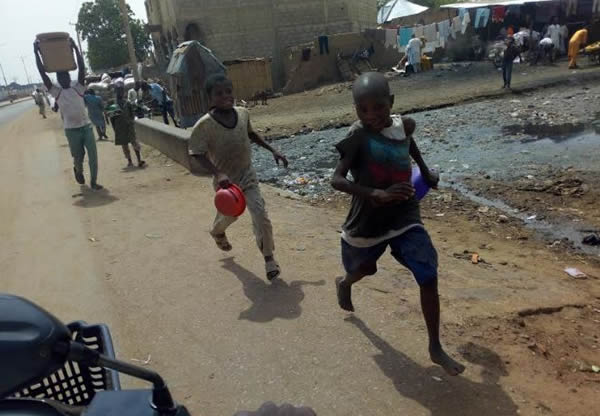
Almajiri
“As a boarding school, we give them breakfast, lunch, and dinner, one of the cooks said.
Commenting on begging in the school, the director of Almajiri integrated education, Bello Umar told TheCable there are over 2000 Almajiri children in Sokoto.
“Whenever we try to solve the problem (begging), it emerges again. It is pitiful seeing the children begging. It is a bad issue here in Sokoto state,” he said. “We care for our own young boys who are out of school and who leave their houses due to lack of food.”
Jabbi Kilgori, state commissioner for basic and secondary education, said in September, the government incorporated 4,000 Quranic schools in the state into the formal education system to boost enrollment.
According to the state education sector plan 2011-2020, parents are the major obstacle in achieving education for all (EFA) initiative because they do not cater for their children thus leaving them at the mercy of the society who feeds them from the proceeds of begging.
“We can enact a law to reduce it but we cannot ban it at all. But the government can be strong on the law. No movement of the children from one town to another. The state governments can form an agency to always catch the children and arrest mallams who told them to go out and beg. It will reduce the massive influx of children begging,” Umar said.




